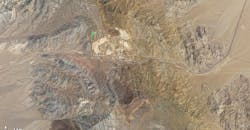Cautionary Rare Earths Tale Found in Molycorp's Rise and Fall
Investors with long memories might be forgiven for a sense of deja vu over warnings about rare earths and Chinese supply.
Chinese state media reports grabbed global attention Wednesday as they dropped heavy hints about export cuts. Rare earths -- a group of 17 obscure, hard-to-pronounce elements used in high-tech and military applications -- are produced for the most part in China. The U.S. has just one mine, and that was at the center of a cautionary tale of commodity boom and bust earlier this decade.
Back in 2010, a slump in Chinese exports sparked concerns about a shortage and alternative sources of supply. Enter Molycorp Inc., the operator of the Mountain Pass mine in California. The company sold shares at $14 apiece in its New York initial public offering in July that year. Rare earth prices zoomed higher, and by May of 2011 the stock topped $75, giving the company a market capitalization of more than $5 billion.
Yet, despite much speculation, a true physical shortage of rare earths never materialized. Prices peaked in 2011 and eventually gave up most of their gains. More supply came onto the market from Australia and Malaysia.
Molycorp attempted a strategic pivot by acquiring Neo Material Technologies Inc., a Canadian metals processor, for $1.2 billion in 2012. But relentless rare earth deflation was ultimately the death knell for Molycorp. It couldn’t eke out sustained profitability, and by early 2015 it was talking to debt-restructuring advisers. The company filed for bankruptcy protection in June of that year, listing assets of $2.49 billion and liabilities of $1.79 billion.
Fast forward to the present and Mountain Pass is under new ownership while rare earths are caught up in the trade war between the U.S. and China. Prices for a handful of the elements -- neodymium, praseodymium and dysprosium -- have recently jumped, though they are nowhere near the dizzying highs seen eight years earlier.
To be sure, this time may be different: The stakes have grown steadily higher in the trade dispute between the world’s two largest economies. But it’s also worth pausing to reflect on what happened when the rare earth bubble burst.
By Simon Casey
About the Author
Bloomberg
Licensed content from Bloomberg, copyright 2016.
